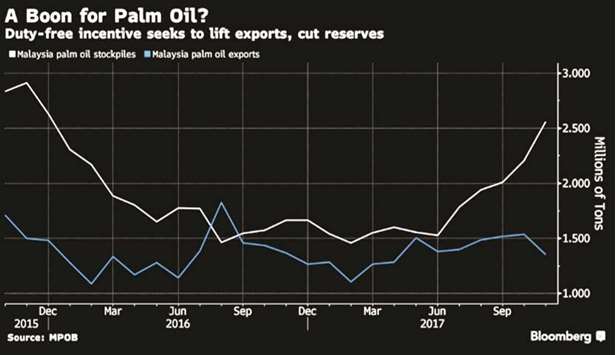Indian buyers will be among the biggest beneficiaries of Malaysia’s decision to suspend export duties on crude palm oil, with first quarter imports tipped to rise to the highest in more than two years.
Shipments may rise by between 100,000 metric tonnes and 150,000 tonnes a month to as high as 850,000 tonnes in January and 950,000 tonnes in both February and March, said Sandeep Bajoria, chief executive officer of Sunvin Group, a Mumbai-based broker and consultant for the oilseeds industry. That could see first quarter purchases of as much as 2.75mn tonnes, the highest since the last quarter of 2015, according to data from the Solvent Extractors’ Association of India.
The January 8 to April 7 tax freeze comes at an opportune time after India, the world’s biggest buyer of palm oil, increased import duties on vegetable oils in November. Overall purchases fell 11% year on year in November, the first drop in 10 months. Exports from Malaysia fared worse – slumping 24% from the year before.
“With the tax removal, India will be able to buy more palm oil,” Sunvin’s Bajoria said by phone. “The cold season in India will come to an end in January. At that time, the demand for palm oil will increase substantially,” he said. It will make Malaysian exports more competitively-priced, with soybean oil in India already about $145 a tonnes more expensive than palm oil, he said.
Exports by Malaysia’s Felda Global Ventures Holdings Bhd, the world’s top producer of crude palm oil, to major buyers such as India, Pakistan, China and Europe will rise by 30% to 50% thanks to the export tax suspension, the company said in a statement on its website.
That would help Malaysia reduce domestic inventories and lift prices to average between 2,650 ringgit ($661) a tonnes to 2,750 ringgit a tonne in the first quarter, group chief executive officer Zakaria Arshad said in a statement last Tuesday.
The price impact may be muted by factors such as the strength in Malaysia’s ringgit – the currency in which benchmark palm oil is priced – as well as high stockpiles, Ivy Ng, regional head of agribusiness at CIMB Investment Bank Bhd, wrote in a January 8 note. The Malaysian currency surged to a 16-month high last Monday and the nation’s stockpiles likely rose to the highest in more than two years in December, according to a Bloomberg survey ahead of official board data.

.
